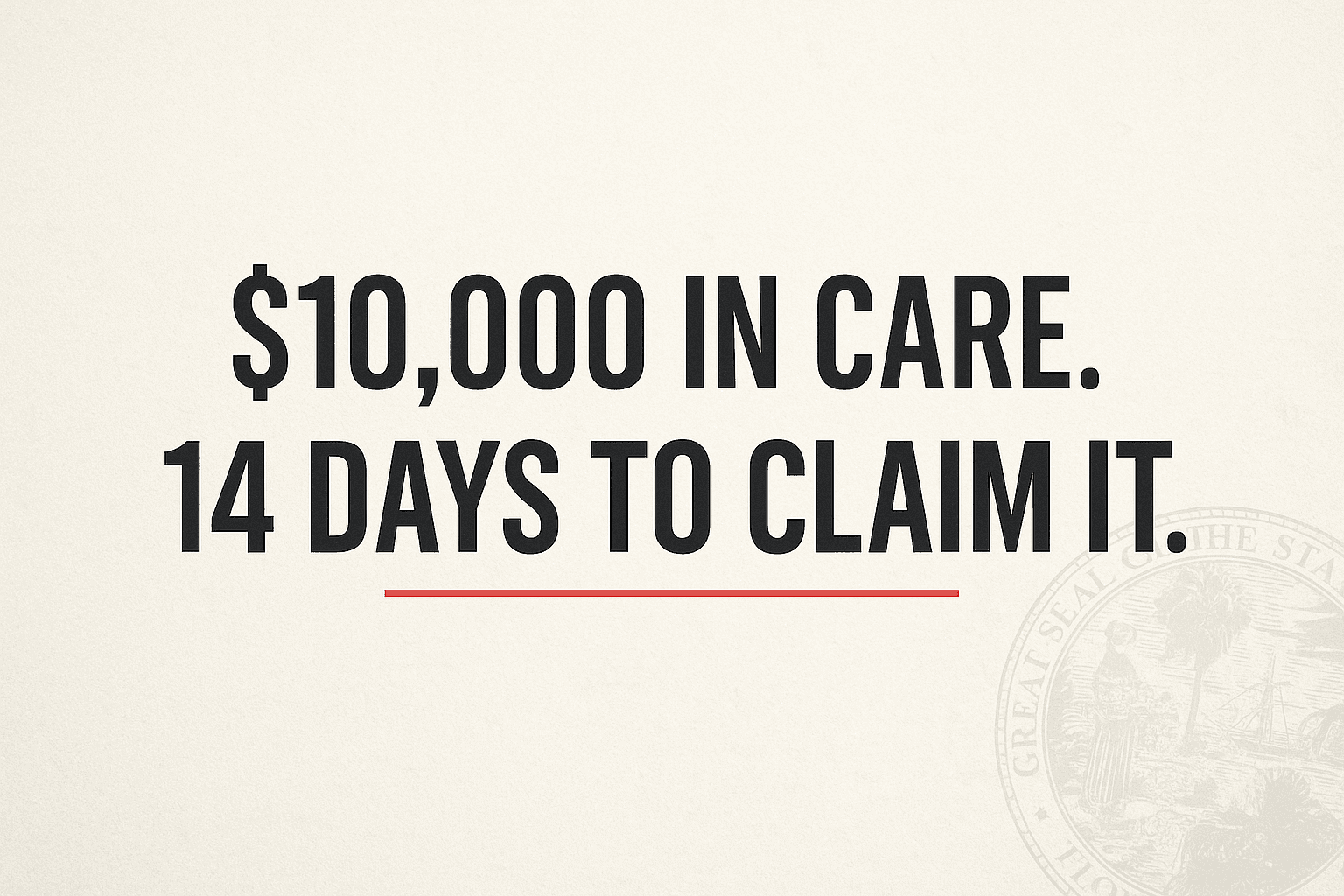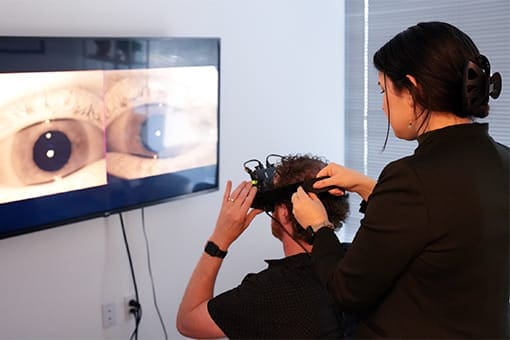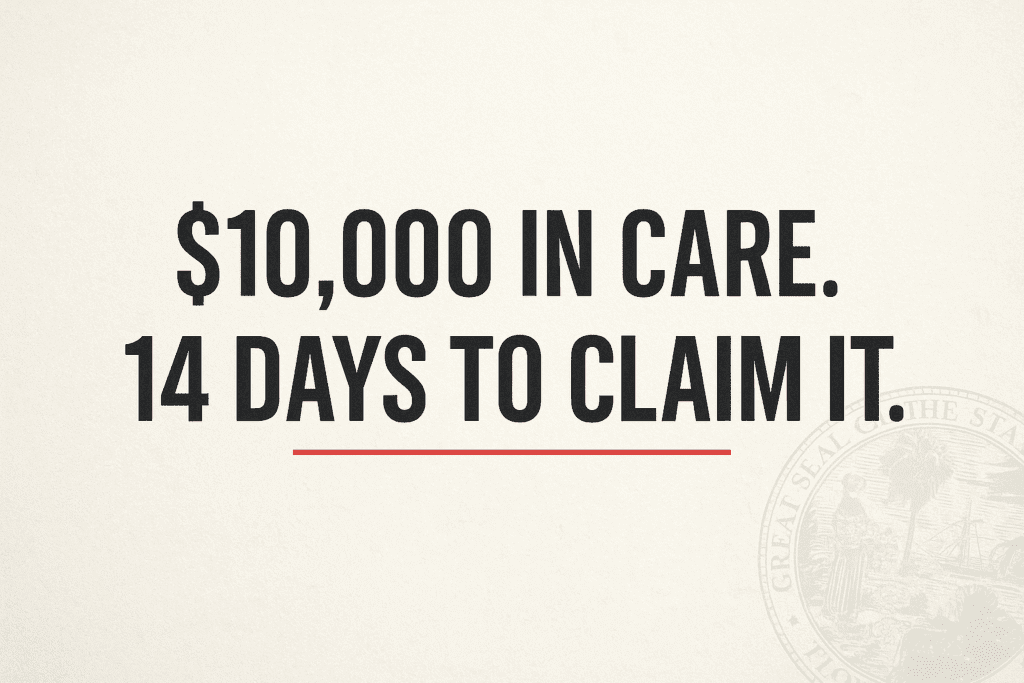TBI tests are the single most important step you can take after a car accident to detect and treat brain injuries in car accidents and in Florida, there’s no reason to wait.
In fact, your first call after a crash, once you’re safe, should be to get tested.
Here’s why:
Florida law gives you just 14 days to seek initial medical treatment if you want to use your Personal Injury Protection (PIP) benefits. Miss that window, and you could lose coverage for your testing and early care.
Florida is a no-fault state, meaning you have up to $10,000 in coverage if your injuries meet the criteria for an Emergency Medical Condition (EMC). If your injuries aren’t classified as an EMC, your benefits may be capped at $2,500.
At Genesis Brain Institute:
You immediately have access to $2,500 for testing and care.
Because we have an EMC on staff, if testing shows you need further medical attention, we can coordinate your next steps so you can use the remaining coverage available under your insurance for the care you require.
If needed, we can also connect you with a trusted local attorney or chiropractor, ensuring your legal and physical recovery work hand-in-hand with your brain health care.
Bottom line: There is no financial reason to delay. The real risk is not knowing if you’ve sustained an injury that could affect you for years.
Put Simply…Just get checked out.
Why Signs and Symptoms of TBI Injury are Missed After A Car Accident
A car accident can change your brain in ways that aren’t immediately visible to you or even to the doctors in the ER.
The sad truth? Many people are sent home with a “clean” scan and a false sense of security, only to realize weeks or months later that something is very wrong.
Research from the University of Cambridge found that almost 50% of people with a mild concussion (mTBI) still showed measurable changes in how their brain communicates months after the injury, even when standard scans like CT or MRI looked normal. These disruptions were linked to persistent fatigue, thinking and memory problems, and mood changes.
The Limits of Standard Scans
CT (computed tomography) and MRI (magnetic resonance imaging) are lifesaving tools for detecting:
Skull fractures
Brain bleeds
Major swelling
Tumors or cysts
But these scans are structural, they take a picture of your brain’s anatomy.
They can’t see:
Microscopic axonal damage (tiny tears in nerve fibers)
Connectivity disruptions (how brain regions talk to each other)
Electrical activity changes that affect focus, mood, and memory
These functional changes are the real culprits behind most long-term symptoms after a car accident and they’re invisible to standard imaging.
Low-Impact Collisions Can Still Cause Significant Injury
It’s a common misconception that only high-speed crashes cause TBIs. Research and our clinic experience shows otherwise.
Though not always crash specific, biomechanical modeling studies show that even low- to moderate-speed frontal impacts can generate enough head acceleration to exceed thresholds associated with concussion-like injuries
Even a collision at 10–15 mph can cause the brain to:
Slam into the inside of the skull (coup injury)
Bounce back and hit the opposite side (contrecoup injury)
Twist or rotate in a way that stretches delicate axons

You don’t have to hit your head.
You don’t have to black out.
You don’t even have to feel “hurt” at the scene for damage to occur.
The Delayed Damage Timeline
When a TBI from a low-impact crash isn’t detected and treated early, symptoms can snowball:
Weeks after the accident:
Mild headaches
Occasional brain fog
Feeling “a little off” but brushing it off
Months later:
Trouble focusing at work or school
Increased irritability or mood swings
Reading and comprehension problems
Vision strain or eye-tracking issues
Years later:
Chronic migraines
Sleep disturbances
Difficulty walking in a straight line
Trouble finding words in conversation
Ongoing depression or anxiety without clear cause
We’ve seen patients whose lives changed in slow motion, where the symptoms crept in so gradually they didn’t connect them to the accident until much later.
This is exactly why testing right away is so important. The earlier we catch these changes, the faster and more fully the brain can recover.
And that’s where our Tier 1 Neuro-Functional Screening comes in.
Tier 1: Neuro-Functional Screening for Traumatic Brain Injury
When you’ve been in a car accident, whether it was a high-speed collision or a low-impact fender bender, your first medical step should be ruling out a TBI.
At Genesis Brain Institute, that process often starts with our Tier 1 Neuro-Functional Screening.
Why Start Here?
It’s fast. The screening is rapid in office.
It’s affordable. Covered by your PIP benefits.
It’s precise. Uses sensitive measurements that can detect injury before symptoms fully develop.
It’s actionable. If results indicate possible brain injury, we can move immediately into more advanced testing like qEEG Brain Mapping.
What’s Included in Tier 1 Screening
Videonystagmography (VNG):
Tracks eye movements to assess the brainstem and vestibular (balance) system.
Eye-tracking changes are among the earliest signs of a TBI, even in mild cases.
Balance Assessment:
Uses force plate technology to detect subtle stability issues.
Many patients don’t notice these problems consciously, but the test reveals them in precise data points.
Pupillometry:
Measures how quickly your pupils respond to light.
A slowed response can indicate autonomic nervous system dysfunction, a frequent companion of brain injury.
Real-World Example: The “Fine at First” Driver
A patient in his early 40s came in after a low-speed side impact collision.
At the scene, he felt fine. No loss of consciousness. No head hit. The ER sent him home.
Two weeks later, he noticed:
Difficulty reading reports at work
Mild dizziness when getting up quickly
Trouble remembering where he left his keys
Tier 1 Screening revealed:
Abnormal eye-tracking on VNG
Balance instability on force plate
Sluggish pupil response
Because we caught these changes early, we moved him into qEEG Brain Mapping and targeted therapy.
Within months, his symptoms were gone but had we waited, they might have become chronic.
Why It’s Like the NFL’s Sideline Concussion Protocol — But Better
In the NFL, athletes suspected of concussion undergo quick sideline tests for balance, vision, and cognition.
Tier 1 Screening applies the same principles but with medical-grade precision and advanced measurement tools.
The difference? Instead of just deciding whether you go back into the game, we use the data to guide your full recovery plan.
TBI Symptoms After a Car Accident — Even with a “Normal” Scan
One of the most dangerous myths about brain injuries is:
“If my CT or MRI is normal, I’m fine.”
The truth?
You can have a serious traumatic brain injury, especially a mild traumatic brain injury (mTBI) and pass every standard hospital scan.
That’s because those scans only look for structural damage like bleeding or swelling, not the functional changes that can completely derail your thinking, mood, and coordination.
Symptoms Of TBI After a Car Accident
Cognitive Symptoms
Brain fog or feeling “mentally slow”
Short-term memory problems
Trouble focusing on tasks or conversations
Difficulty reading or following instructions
Physical Symptoms
Headaches or migraines
Dizziness or loss of balance
Sensitivity to light and noise
Changes in vision, blurriness, eye strain, or double vision
Fatigue that doesn’t improve with rest
Emotional & Behavioral Symptoms
Irritability or mood swings
Anxiety or panic
Depression or loss of motivation
Changes in sleep patterns, trouble falling asleep, waking often, or sleeping too much
Delayed Onset: Why TBI Symptoms Sometimes Appear Weeks Later
Immediately after a crash, adrenaline can mask symptoms. You might feel fine in the ER but notice changes days or weeks later.
We’ve seen cases where symptoms didn’t appear until:
Returning to work or school exposed the brain’s reduced stamina
Physical activity triggered dizziness or headaches
Social situations became overwhelming due to sensory sensitivity
Real-World Example: The “Late Bloomer” Symptoms
A woman in her 30s was rear-ended at a stoplight. No head impact. Walked away feeling fine.
Three weeks later, she began:
Misplacing everyday items
Struggling to find words mid-sentence
Avoiding reading because the words “moved” on the page
Her MRI was normal.
Our qEEG Brain Mapping showed disrupted connectivity in the frontal and occipital lobes, explaining her memory and vision issues. Targeted therapy restored her reading comfort and recall within months.
Take the First Step Now
If you’ve been in a car accident, even a “minor” one and notice any of these symptoms, don’t wait.
Start with our quick TBI Symptoms Quiz to see if your symptoms match common post-injury patterns.
Then, get scheduled for Tier 1 Neuro-Functional Screening within your 14-day insurance window so we can either:
Rule out a TBI, giving you peace of mind, or
Catch it early and start your personalized recovery plan
Best Tests for Mild Traumatic Brain Injury (mTBI)
If you’ve been in a car accident and suspect a brain injury, you need more than a quick ER scan.
To truly know what’s going on, you need a comprehensive approach that looks at both the structure of your brain and its function, how well it’s actually working day-to-day.
At Genesis Brain Institute, testing happens in tiers so nothing is missed:
Tier 1: As Mentioned Above
This is where we start after any suspected brain injury from a car accident.
It’s fast, low-cost, and designed to flag possible brain injury through:
Videonystagmography (VNG)
Balance testing
Pupillometry
If Tier 1 shows anything concerning, our Emergency Medical Condition (EMC) provider will recommend moving to Tier 2 for more in-depth analysis.
Tier 2: Advanced Functional Brain Testing
This next level of testing goes far beyond what you’d get in a standard ER visit.
It’s designed to pinpoint the exact areas of the brain that are:
Underperforming
Overactive
Struggling to communicate effectively with other regions
Tier 2 may include:
qEEG Brain Mapping — Seeing What CT & MRI Can’t
A quantitative electroencephalogram (qEEG) measures your brain’s electrical activity and compares it to a database of healthy patterns for your age and gender.
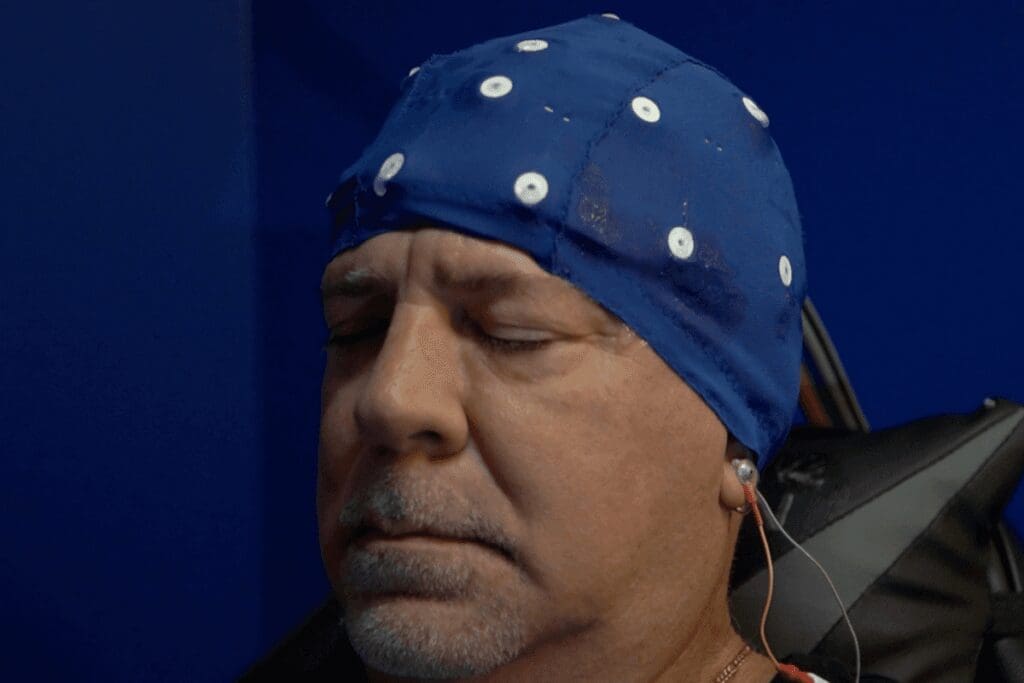
Why it’s powerful for TBI detection:
Identifies abnormal brainwave patterns linked to injury
Reveals disrupted connectivity between brain regions
Can detect functional damage that CT and MRI often miss
Research shows qEEG can spot brain injuries with up to 95% accuracy, even when other scans look normal.
Studies on qEEG for TBI detection show it’s not only valuable in the clinic, it’s also been accepted as objective evidence in court when backed by peer-reviewed research.
qEEG has been accepted in courts as objective evidence when supported by peer-reviewed studies
It’s particularly valuable in mild TBI cases with normal standard scans but ongoing symptoms
Think of qEEG as a “performance scan” for your brain, it doesn’t just look for damage, it measures how well your brain is actually working.
Vestibular & Balance Testing
Even subtle disruptions to the vestibular system can affect walking, turning your head, or navigating busy environments without dizziness.
We use:
Videonystagmography (VNG) to track eye movement responses
Computerized balance platforms to detect postural instability
Neurocognitive Testing
Measures how well your brain processes, stores, and retrieves information.
Helps identify deficits in:
Reaction time
Memory
Attention span
Problem-solving skills
When paired with qEEG, these tests create a clear link between brainwave abnormalities and real-life symptoms.
Structural Imaging (CT/MRI)
While structural imaging may miss functional injuries, it’s still an important piece of the puzzle, especially when higher-level care is warranted.
That’s why Genesis Brain Institute has a broad spectrum of doctors involved in patient care.
If our MD or neurologist sees something in your results that requires further investigation, they may recommend you see our neurosurgeon, who can order an MRI or other imaging as needed.
This ensures you get the right test at the right time, without bouncing between providers or waiting months for a referral.
Why Comprehensive Testing Matters
No single test tells the whole story.
By layering these tools, we can:
Confirm or rule out a TBI
Identify exactly what’s impaired
Create a targeted treatment plan
- Provide objective data for insurance or legal documentation
Both Tier 1 and Tier 2 testing are typically covered under Florida PIP benefits when done within the 14-day post-accident window, making early testing both smart and cost-effective.
The Legal & Insurance Value of Documented Testing
When you’ve been in a car accident, getting the right tests is about more than just finding out if you have a brain injury.
It’s also about protecting your future, both medically and legally.
Why Documentation Matters
Insurance companies and legal teams rely on objective evidence to validate injury claims and ensure patients receive the care they need.
If you don’t have documented proof of your injury and its progression, you may:
Struggle to get certain treatments approved
Have your coverage reduced or denied
Face challenges in legal cases related to the accident
This is why Genesis Brain Institute documents every step of your care, from your very first Tier 1 screening to your most recent progress check.
What We Document Along the Way
Initial Findings: Results from Tier 1 and Tier 2 testing, establishing the baseline of your brain health after the accident
Specialist Recommendations: Notes from our MD, neurologist, or neurosurgeon when further testing or treatment is required
Ongoing Progress Reports: Follow-up assessments showing improvements, setbacks, and the effectiveness of treatments
Treatment Protocols: Detailed records of therapies used, frequency, and response over time
Final Outcome Reports: Comprehensive summaries that demonstrate your journey from injury to recovery
How This Protects You
For Your Health
Ensures every provider involved in your care has the most up-to-date information
Prevents miscommunication or repeated tests
Allows us to adjust your treatment plan as your brain heals
For Your Legal Team
Provides a clear, time-stamped trail of injury evidence
Supports your case with objective medical data, not just symptoms you report
Strengthens settlement negotiations or courtroom arguments with scientifically validated test results
qEEG in Legal Cases
Peer-reviewed studies confirm qEEG has been accepted as objective evidence in legal cases.
qEEG has been used successfully in legal proceedings when supported by peer-reviewed research
Courts have admitted qEEG evidence to demonstrate the presence and severity of brain injury, especially in cases where CT/MRI appeared normal
This means that when you get tested here, you’re not only getting the best available diagnostic technology, you’re also building a bulletproof medical record that can stand up to scrutiny.
The 14-Day Window
Remember, under Florida’s PIP law, you must seek care within 14 days of your accident to access your benefits.
Starting your testing quickly ensures your injury is documented while it’s still directly linked to the crash, avoiding insurance disputes later.
When it comes to both your health and your rights, early testing and consistent documentation are your best defense.
From Testing to TBI Treatment: The Genesis Brain Institute Approach
At Genesis Brain Institute, testing is only the first step.
Once we’ve identified a brain injury, our focus shifts to healing the brain, restoring function, and addressing the emotional impact of the accident.
We don’t just hand you a report and wish you luck.
We create a customized treatment plan that’s guided by your exact test results and supported by a multidisciplinary team under one roof.
A Coordinated Multidisciplinary Team
Your care doesn’t happen in isolation.
Our team includes:
MD and Neurologist: Oversee diagnostics and coordinate care for complex cases
Neurosurgeon: Available for advanced imaging and surgical consultations if needed
Pain Management Specialist: One of the few pain management doctors in Tampa, who also board-certified in anesthesiology, bringing a full-body, nervous-system approach to injury and pain.
Licensed Mental Health Counselor: Provides support for post-accident PTSD, anxiety, or depression, which are common after both mild and severe TBIs
Rehabilitation Specialists: Guide you through neurofeedback, biofeedback, vestibular therapy, and cognitive retraining
Our Unique TBI Treatment Approach
Because no two brain injuries are the same, every plan is built from the ground up using your Tier 1 and Tier 2 data.
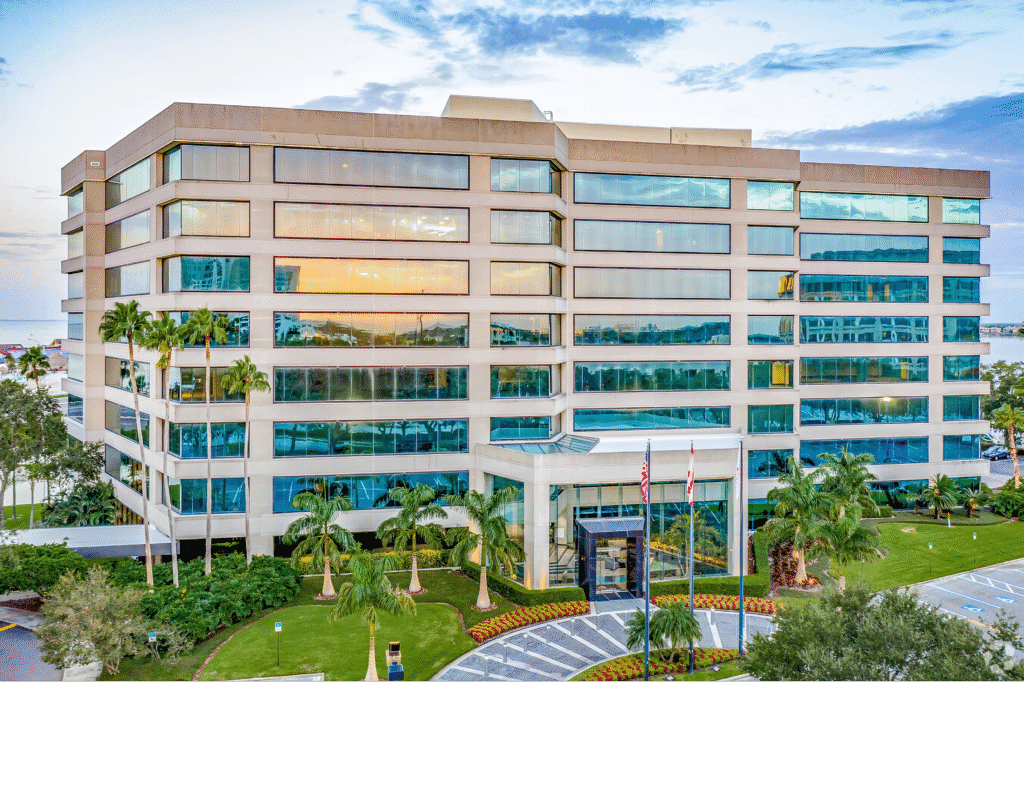 Treatment options may include:
Treatment options may include:
Neurofeedback Therapy: Helps retrain brainwave patterns to restore healthy communication between regions
Biofeedback Therapy: Improves nervous system regulation to reduce stress, headaches, and emotional volatility
Vestibular & Balance Rehabilitation: Targets dizziness, unsteadiness, and visual motion sensitivity
Cognitive Therapy: Strengthens memory, focus, and processing speed
Mental Health Counseling: Addresses the emotional trauma and anxiety that often follow an accident
TMS (Transcranial Magnetic Stimulation): A non-invasive therapy that uses magnetic fields to stimulate specific brain regions involved in mood, focus, and recovery after injury
Why This Matters
By combining advanced diagnostics with targeted, multidisciplinary care, we:
Treat both the physical and emotional consequences of a TBI
Ensure kids and adults alike get age-appropriate, specialized care
Keep your entire care team on the same page through shared documentation
Monitor your progress so your treatment adapts as your brain heals
If you’ve been tested somewhere else and were told “everything is fine” but you know you’re not the same, we can re-evaluate with our advanced tools and team approach.
What Happens If You Don’t Treat a TBI
The brain is incredibly resilient but it’s also highly adaptive.
If it’s injured and not given the right support, it can “rewire” itself around the injury in ways that make problems permanent.
When a TBI goes untreated after a car accident, the effects can ripple out for months, years, or even a lifetime.
The Short-Term Risks of Waiting
Worsening symptoms: Headaches become chronic, brain fog deepens, and dizziness increases
Emotional distress: Anxiety, depression, and mood swings intensify as your brain struggles to regulate itself
Reduced quality of life: Fatigue, memory lapses, and focus problems interfere with work, school, and relationships
The Long-Term Consequences
If you push through the symptoms without treatment, you may face:
Permanent cognitive deficits: Trouble with memory, attention, and processing speed that never fully resolve
Chronic headaches or migraines: Ongoing pain that limits daily function
Balance and coordination problems: Persistent instability that increases fall risk
Sleep disorders: Ongoing insomnia or unrefreshing sleep that worsens overall health
Heightened mental health issues: PTSD, depression, and anxiety can become deeply entrenched
Why Even “Mild” Injuries Can Have Big Consequences
Low impact accidents are often brushed off as “no big deal.”
But we’ve seen countless cases where a seemingly minor collision, the kind that leaves your car with only a small dent, sets off years of cognitive, physical, and emotional challenges.
The earlier a brain injury is identified, the more likely it can be reversed or minimized.
That’s why we push for testing immediately, not weeks or months down the line.
The Hope in Acting Now
When you identify a TBI early and begin targeted treatment:
Brain function can often be restored
Symptoms improve faster and more fully
You avoid long-term adaptation to impaired patterns
You protect both your health and your rights under Florida’s PIP law
The choice is simple: act now, and you give your brain the best chance at full recovery. Wait, and you risk living with an injury you can’t see but will feel every day.
TBI Tests for Brain Injuries in Car Accidents: Your Next Step Starts Now
If you’ve been in a car accident, even a “minor” one TBI tests are your first and most important step.
They can confirm you’re in the clear or catch brain injuries in car accidents that are invisible on standard scans, but can cause years of frustration if left untreated.
At Genesis Brain Institute, we’ve built a complete system for post-accident brain injury care:
Tier 1 Screening to quickly flag possible problems
Tier 2 Testing to pinpoint exactly what’s happening in your brain
A multidisciplinary team including MD, neurologist, neurosurgeon, board-certified pediatrician, and licensed mental health counselor for PTSD after accidents
Targeted treatments that restore brain health and address the emotional impact of an accident
And in Florida, your PIP benefits mean there’s no financial reason to wait, as long as you start within 14 days.
Here’s What to Do Right Now
Take our quick TBI Symptoms Quiz to see if what you’re feeling matches common post injury patterns.
Schedule your Tier 1 Screening immediately, so we can either give you peace of mind or get you started on a treatment plan for a concussion.
Just get checked out.
One hour of testing today can save you years of cognitive decline, emotional distress, and reduced quality of life from untreated brain injuries in car accidents.
Your brain is worth it and we’re here to protect it.
Disclaimer: This content is for informational purposes only and does not constitute medical advice. Please consult with a licensed healthcare provider. Genesis Brain Institute is a Brain Treatment Center in Tampa offering non-pharmaceutical solutions that bring clarity, restore function, and offer real hope for those who feel lost, stuck, or simply want more from life.

